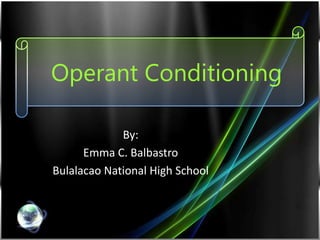
Operant conditioning
- 1. Operant Conditioning By: Emma C. Balbastro Bulalacao National High School
- 2. What Is Operant Conditioning? Operant conditioning is a method of learning that occurs through rewards and punishments for behavior. Through operant conditioning, an association is made between a behavior and a consequence for that behavior.
- 3. Operant conditioning was coined by behaviorist Burrhus Frederic Skinner, who believed that the organism, while going about it's everyday activities, is in the process of “operating” on the environment. In the course of its activities, the organism encounters a special kind of stimulus, called a reinforcing stimulus, or simply a reinforcer. This special stimulus has the effect of increasing the behavior occurring just before the reinforcer.
- 4. The Skinner’s Box at first the mouse would have just wondered around in search for food and would have accidentally pressed down on the lever whilst exploring. It would then present him with food, and the mouse would associate the pressing of the lever with the presentation of food. Then it'll know whenever it's hungry to press that lever because of that conditioning it went through.
- 5. Skinner used the term operant to refer to any "active behavior that operates upon the environment to generate consequences"
- 6. Examples of Operant Conditioning children completing homework to earn a reward from a parent or teacher employees finishing projects to receive praise or promotions a child who lost recess privileges because he talk out of turn in class
- 7. Components of Operant Conditioning • Reinforcement – A kind of stimulus that aims to increase the strength in behavior due to its consequence • Punishment • Any event that causes a decrease in the behavior
- 8. Types of Reinforcement • Positive Reinforcements are favorable events that are presented after the behavior (Reward Learning) • Negative Reinforcement a response or behavior is strengthened by stopping, removing or avoiding a negative outcome or aversive stimulus (escape-avoidance learning)
- 9. Examples of positive reinforcement: After executing the learning plan, the principal said “Great job”. A student answered all the items correctly in the unit test. The teacher said “ you are exempted in the periodic test”.
- 10. Types of Positive Reinforcers A. Natural reinforcers are those that occur directly as a result of the behavior. For example, a girl studies hard, pays attention in class and does her homework. As a result, she gets excellent grades.
- 11. B. Token reinforcers are points or tokens that are awarded for performing certain actions. These tokens can then be exchanged for something of value.
- 12. C. Social reinforcers involve expressing approval of a behavior, such as a teacher, parent or employer saying or writing "Good job" or "Excellent work."
- 13. D. Tangible reinforcers involve the presentation of an actual, physical reward such as candy, treats, toys, money and other desired objects.
- 14. When is positive reinforcement most effective? • When it occurs immediately after the behavior • When the reinforcement is presented enthusiastically and frequently
- 15. Negative Reinceforcement • Examples: – You leave your house early to avoid being late – You clean up your mess in the kitchen to avoid in a fight with your roommate
- 16. When is negative reinforcement most effective? • it is most effective when reinforcers are presented immediately following a behavior
- 17. Schedule of Reinforcement • A schedule of reinforcement is a rule stating when and how often a behavior will be reinforced. –This is applicable when you are purposely trying to train and reinforce an action
- 18. Types of reinforcement schedules 1. Continuous Reinforcement the desired behavior is reinforced every single time it occurs. Generally, this schedule is best used during the initial stages of learning in order to create a strong association between the behavior and the response.
- 19. 2. Partial Reinforcement the response is reinforced only part of the time. Schedules of partial reinforcement: 1. Fixed-ratio schedules are those where a response is reinforced only after a specified number of responses.
- 20. 2. Variable- ratio schedules occur when a response is reinforced after an unpredictable number of responses. 3. Fixed-interval schedules are those where the first response is rewarded only after a specified amount of time has elapsed. 4. Variable-interval schedules occur when a response is rewarded after an unpredictable amount of time has passed
- 21. Punishment Punishment is a kind of stimulus that aims to decrease the strength in behaviour due to its consequence.
- 22. Kinds of punishment • Positive punishment involves presenting an unfavorable outcome or event following an undesirable behavior (punishment by application) Example: wearing favorite dress to class but reprimanded by the teacher for violating the school’s dress code
- 23. Negative punishment • It involves taking something good or desirable away to reduce the occurrence of particular behavior. (punishment by removal) Example: after getting low grades in her subjects because of spending more time in texting rather than in studying, her mother takes her cellphone away.
- 24. • Negative punishment is more effective if: • It immediately follows a response. • It is applied consistently.
- 25. Increases Decreases Stimulus is presented Stimulus is removed POSITIVE REINFORCEMENT Consequences Strength of Behavior POSITIVE PUNISHMENT NEGATIVE PUNISHMENT NEGATIVE REINFORCEMENT
- 26. THE END
